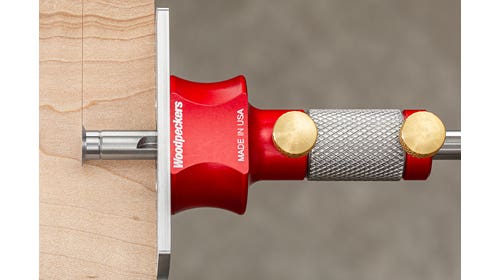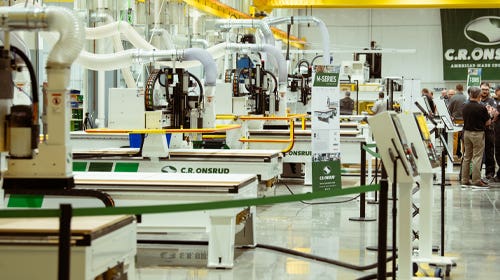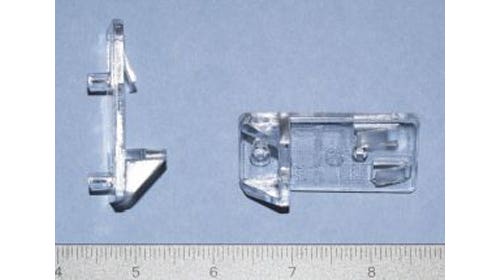Members work to save gallery
It’s certainly no secret that the last 18 months has been a trying time for small and medium custom shops. Many furniture, cabinet and millwork shops have had to take…
It's certainly no secret that the last 18 months has been a trying time for small and medium custom shops. Many furniture, cabinet and millwork shops have had to take unprecedented measures to stay in business, while others unfortunately have had to close their doors.
There is another facet of the custom woodworking industry, admittedly smaller but nevertheless important, that has had to be creative in order to continue operating. The plight of galleries, particularly critical to many custom furniture makers, has been largely overlooked during the recession.
Northwest Fine Woodworkingopened its doors in 1980 in Seattle's historic Pioneer Square. It was founded by a small group of members, within the Northwest Guild of Fine Woodworking, who wanted to create a community venue for the sale and display of superior handcrafted woodwork. The gallery is unusual due to its operation as a cooperative in which it is owned by its' craftspeople.
In the early years, each member put in their own time managing and renovating the gallery. From its modest beginnings, the gallery has grown to include around 30 members and 200 nonmembers.
"When the gallery first started, the members worked in the store and there was no staff," recalls Bob Spangler, a custom furniture maker from Bainbridge Island, Wash., and gallery member for about 21 years. "The members would come in and be the salesperson and do everything that had to do with running the gallery. Of course, they soon realized that it wasn't a very good approach because the gallery was growing by leaps and bounds then and you also had one 'sales associate member' talking to somebody and then the next day you had somebody else, so there was no continuity with the members. They found that it wasn't a very good approach so they started hiring staff."
As the gallery became more successful, its staff grew to include a director and as many as eight employees. The gallery developed a reputation for being one of the finest in the Pacific Northwest and the quality of the work displayed was superb. But when the problems with the economy began to surface in 2008, the situation changed dramatically.
"Two years ago the gallery was going along; sales were declining maybe a little bit," Spangler says. "But the biggest crash came about a year, year-and-a-half ago, and just knocked everything out of kilter. A year ago at this time we were at the point where we might have had to close the gallery and instead we cut staff down to almost nothing. We kept one salesperson. We went from a staff which was once seven or eight and then about a year ago we went down to one salesperson with the members working in the store."
"I think we could see that we were getting in trouble when our backlog started to shrink," says David Gray, president of the gallery's board of directors. "We call it the forward order log and that started getting smaller and smaller. Usually we're running $180,000 to $300,000 of orders sitting, waiting to be produced and delivered. We could see in the fall of last year that it was shrinking and also that our cash reserves were getting depleted."
Northwest Fine Woodworking, which for years was open for business seven days a week, cut back and closed its doors on Sundays and Mondays. The gallery operated with one salesperson and a part-time bookkeeper, the Web site presence was cut in half and other cost-cutting measures were taken.
"Even with all those interventions it still wasn't working," says Gray. "Our outlay every month was too much. We met with an advisor and she said basically you need to stop the bleeding and you've got to cut your expenses to the bare bone."
Members began working shifts at the gallery in an effort to keep it operating, just as they had nearly 30 years ago when it first opened its doors. The public responded positively to the members' presence in the gallery and just may have saved its existence.
"They seemed to like it, that they could actually talk to the woodworker who was making the stuff," Spangler says. "We decided, since it was working so well, to have the members be in the store, we kept the members coming in on the weekends. That was one of the things that saved it for sure because we were able to stay open."
"Now we've kind of geared back up," Gray says. "We've hired our director back on an hourly basis, basically just to promote shows and we've hired a news salesperson that comes in a maximum of 24 hours a week. So we're open all seven days again now. We're in negotiations with our landlord and the reason that we're still there is that they've been flexible and very good to us. I think part of it is we just cut back to the bare minimum and also the landlord has worked with us."
The gallery has recovered for the time being, but there certainly are no guarantees that its survival is permanent.
"The name of the game changes; every month you think you have a plan, but then it doesn't work or some situation you don't have control over changes and you just have to keep adapting," explains Gray. "I think we've decided that we just have to plug away and do our best ... you have to invest yourself in the business."
Contact: Northwest Fine Woodworking, 101 South Jackson St., Seattle, WA 98104. Tel: 206-625-0542. www.nwfinewoodworking.com
— Brian Caldwell






